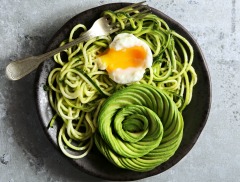Don't just meal plan... meal plan intelligently - with Meal Genius! Sign up for our free newsletter to get delicious recipes, sample meal plans and a whole lot more!
Seeds, Pumpkin
Pumpkin seeds are a nutritional standout and have been used for their medicinal properties in Europe and China for centuries.
Known as "pepitas" - which means little seed in Spanish - and widely used in Mexican cooking, pumpkin seeds can be enjoyed as a snack, added to salads or ground up to make a unique pesto.
In addition to providing an excellent source of magnesium and iron, pumpkin seeds also provide immune-boosting zinc and phytonutrients called curcurbitacins which researchers have found pack a powerful punch against prostate problems.
The Benefits
- Special diets: Gluten-Free Diet, Gluten-Free/Dairy-Free Diet, Grain-Free Diet, High Protein Diet, Low Acid Diet, Low FODMAP Diet, Low Starch Diet, Paleo Diet (Light), Paleo Diet (Strict), Pescetarian Diet, Primal Diet, Vegetarian Diet, Whole Food
- Excellent Source of: Iron, Magnesium, Phosphorous, Manganese
- Good Source of: Protein, Zinc, VitaminK, Copper
- Preferences: No Molds, No Citrus, No Pseudograins, No Coconut, No Fish, No Red Meat, No Pork, No Eggs, No Shellfish, No Gluten, No Nuts, No Soy, No Dairy, No Poultry, No Nightshade, No Corn, No Yeast, No Peanuts, No Legumes, No Grains, Low Carbohydrate, Low Cholesterol, Low Sodium, Low Sugars
Related Foods
Related Nutrients
Selecting and Storing
Pumpkin seeds are sold in the shell, shelled, roasted, and raw. Keep pumkin seeds refrigerated; the oil in pumpkin seeds can easily go rancid.









